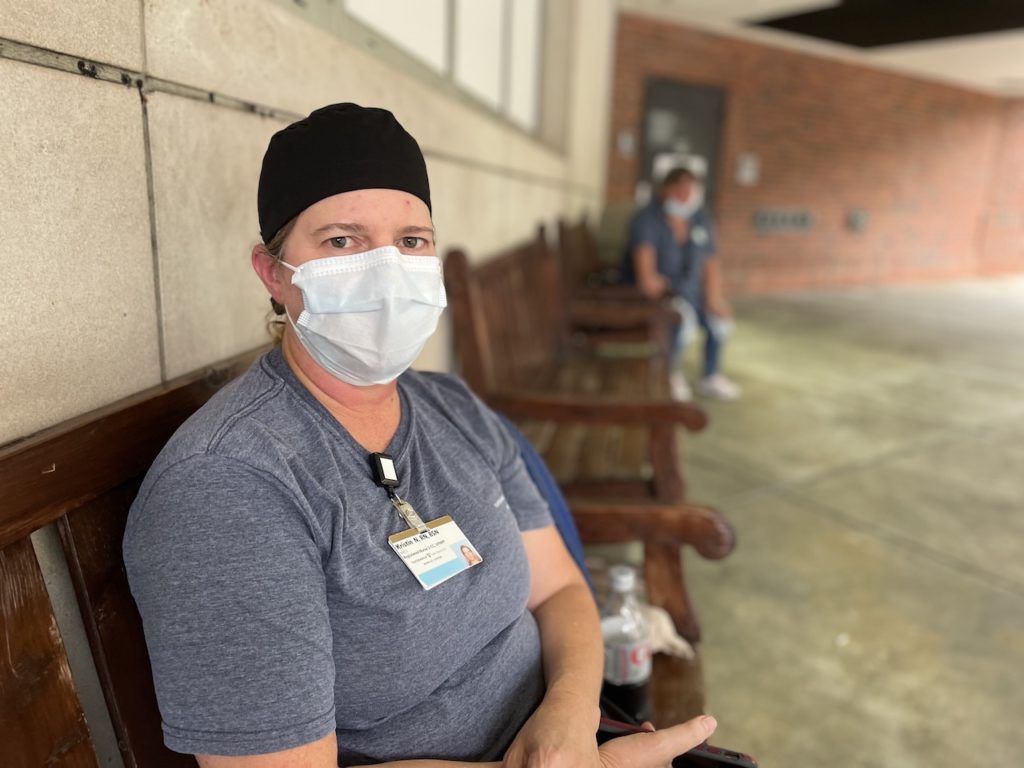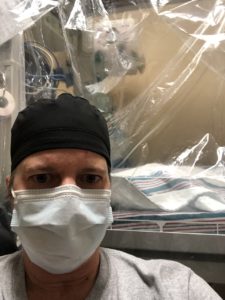
Hospitals across the South have rarely needed nurses so badly — specifically, those experienced enough to work in an ICU. A shortage of RNs is the primary reason hospital capacity has become a problem again. And the work has only become more grueling, as Vanderbilt ICU nurse Kristin Nguyen tells WPLN News.
Nguyen agreed to create an “audio diary” last week, responding to prompts and questions after finishing her overnight shifts. She was working as ICUs statewide hit their limits, with half their patients suffering from COVID.
Listen to the audio above, or read highlights below. Here’s some of what she had to say about coping with the surge in COVID cases.
Wednesday, Aug. 18, 7:40 a.m.
I admitted a patient from West Tennessee overnight who’s COVID-positive. The patient went to an outside hospital near their hometown, but there were no ICU beds. So I guess they started calling around … and ended up in my ICU — very, very sweet person. We’re talking a little bit about how they think they were exposed, and they they said they probably got it from one of their loved ones who is a teacher. And that hit home last night.
Most of these cases that we’re seeing now are totally avoidable, and that is so much harder with the search to see these these patients coming in and barely able to talk more than a word at a time. And it just eats away at your soul.
 Courtesy Kristin Nguyen
Courtesy Kristin Nguyen Over the shoulder of Kristin Nguyen is an incubator in the ICU, placed there in case a baby has to be taken in an emergency c-section as the mother declines from COVID-19.
Thursday, Aug. 19, 8:00 a.m.
I’m actually at home sitting in my garage. I had to drive home and decompress a little bit.
I worked in the medical ICU last night. We go through every patient on the floor and kind of give a brief background. And what struck me was when we got to kind of the COVID end of our unit, we have four or five women on our floor right now in their 20s and 30s who have either had emergency C-sections, have miscarried or are currently pregnant, and we’re hoping that the baby will live.
It’s awful to walk through the unit and see little little baby incubators and little NICU crash carts just in case we do a crash C-section at the bedside to get the baby out alive. I don’t know a whole lot about their backgrounds, but at least one of these women has other children at home. And those children may grow up without a mother. They may never be able to touch their mother again.
I don’t think it can get much more awful than that.
Sunday, Aug. 22, 7:30 a.m.
I have actually been lucky enough to have the same patient for two nights in a row. I’ve had a young early 20-something woman who has been at Vanderbilt almost three weeks and is on a ventilator and is on ECMO, which is the highest level of life support you can basically get. She’s healthy, previously. Her family brought pictures, and there’s pictures of her around the room. She seemed like a very vibrant, happy young woman with a lot of friends. But now she has a tracheostomy, which is basically a hole in your throat. She is probably going to have that tracheostomy for a very long time.
She is sticking with me because she is 22 years old. And now this is her future, at an age where she should be going off to college and having the time of her life.
How much longer can you handle this current marathon?
I don’t know. I’m going to do it for as long as I have some compassion left in my body, because ICU is my thing. I’ve been doing it for 10 years. But it’s very wearing, and we’ve been doing this for 17 months, and it’s only getting worse at this point. It’s not getting better. We thought in July that we actually saw a light at the end of the tunnel, and then this new variant popped up, and it’s taking down everybody who’s unvaccinated. People are suffering long, agonizing deaths, and it is the worst thing to see. … I’m going to end it there before I start crying and try to get some rest.

